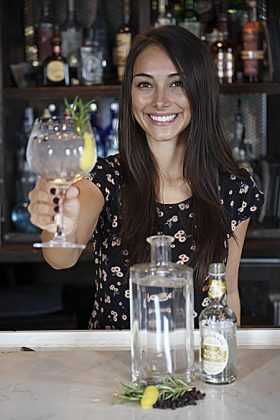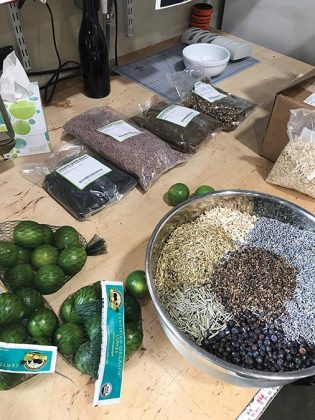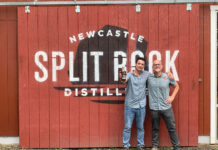In 2013, Caitlyn Krug moved to Spain after graduating from the University of California, Los Angeles. She aspired to work in the hospitality and tourism industry and took a job as a bartender in the Basque Country region. It was there that she experienced a whole new world of premium craft cocktails. She learned what good gin could be and saw the growth in demand for provincial spirits and locally inspired cocktail programs. Caitlyn returned home to the US and joined the corporate world. Five years later, a spontaneous trip to a local art show inspired her to venture out on her own to bring a piece of Spanish-inspired gin culture to the US.
For the past year, Krug has been working to create her own brand of gin using Spanish botanicals. She wants to educate consumers about Spanish drinking culture and bring Spanish-style gin and tonic programs to local bars. But Krug doesn’t want to open her own distillery; she would prefer to be a brand owner, focusing her energy on working with bars, restaurants and consumers. Her corporate experience consulting with large sales teams could give her an advantage in the competitive craft spirit industry. She wants to be the person in bars doing events and building programs, not necessarily the person running the still.
As with all successful brand owners, Krug has done her homework. She attended an ADI conference to learn about available resources, vendors and workshops. She established her brand’s core values, which include prioritizing working with women-owned businesses. She has chosen her base of operations in New Orleans because the craft cocktail scene is hot and growing there. After researching various bottle types, Caitlyn found a packaging development firm to create a label that reflects her company’s message and branding goals. In order to keep labor cost down and quality assurance up, she is also researching screen printing and working to find a bottle decorator.
To develop the gin itself, Krug connected with the team at Spirit Works Distillery in California. After working with the distiller remotely, she traveled there for a few days to distill and experiment until she found her ideal formulation. Caitlyn has identified sources for her base neutral spirit, finalized her packaging, locked down her raw material supply chains, developed her sales and marketing plan and identified her target market. All she needs now is a local co-packer.
Questions to Ask
The relationship brand owners have with their co-packers or contract distillers can vary wildly. Some brand owners prefer to be more hands-off while other brand owners prefer to be embedded in day-to-day operations. Whatever the relationship, a strong written agreement is the key to avoid future issues. Once a brand owner has found a partner distiller or bottler with the right capacity, infrastructure and mutual passion for the project, it’s time to draft the agreement. It is crucially important to define and document as much as possible, including everyone’s role and responsibilities.
Ryan Malkin, a lawyer with Malkin Law P.A., helps draft agreements between brand owners and contract distillers or co-packers. Ryan has seen both successful and failed co-packer relationships. He offered a list of critical questions to ask before firing up the still.
Who is responsible for what?
Work through the flow of the relationship. Which team or role is responsible for ordering raw materials such as bottles, caps, blending ingredients, botanicals and sourced spirits? How soon before production or the bottling run must all the materials be in place? How soon before a bottling run must the COLA be submitted and approved? How many days in advance does the co-packer need to plan a production or bottling run? What happens if there is a last-minute request or change? Both parties should know who is responsible for what.
Is the relationship exclusive?
For the distiller’s side, do you care if you are exclusive and are the sole supplier? For the brand owner, do you also have someone on the East or West coast, both running your product? Can you hedge your bet against supply issues while minimizing transportation costs into key markets using multiple distilleries? With different co-packers and their different equipment and materials, will the product be consistent across markets?
Who owns what?
Who owns and pays for the raw materials or the bulk spirits? Who owns the product and the formula? The client/brand owner traditionally owns the brand. But who owns the formula? Are the spirits or production techniques unique or proprietary to the distiller? In the contract, specify who owns the formula in case one must leave the agreement for another co-packer.
What happens when there are issues or if something doesn’t meet expectations?
Scaling from a test still to a full production run or full batch may not always work as intended. When distilling, what happens if the output doesn’t match the sample? Ryan Malkin noted most disagreements are over the end-product versus a small sample run. What happens if the finished product is cloudy or has other quality issues? What happens if there is an issue with the received raw materials from the agreed upon supplier such as residue in the empty bottles? What happens when the distiller says they followed the formula exactly, but still doesn’t meet expectations? In most cases, the brand owner is on the hook. What happens if the co-packer runs out of stock and can’t meet orders but all the expectations were met by the brand owner?
What happens when changes are needed?
If the distiller or co-packer must make a change to the process or inputs that might impact the taste, is there a sign-off process? What happens if a different bottle, label, botanical or spirit is delivered than originally agreed upon? Both sides need changes in writing. Some common brand owner/client complaints are when a distiller adds an ingredient or uses a different source without approval. It is crucial to outline the process for making changes to the process. If you make changes to anything, sign off first.
What are all the fees and how are payments structured?
What are the raw material and finished good warehouse fees? Is there a flat charge per case to cover labor, overhead and the co-packer’s margin? How is payment made? Does the brand owner pay up front, after production, after bottling, after shipment? Who receives the payment from the distributor? Are there any legal restrictions in the state regarding who can take payment? Warehouse fees and terms/length need to be detailed. If all materials need to be in place before the bottling run, is there a limit on the storage space? Is there a charge for additional warehouse space if needed for surplus inventory? When the distiller is submitting the labels for approval for their DSP, is there a charge for COLA submissions? Is there a limit on COLA resubmissions to prevent excessive back and forth with the TTB? If there is a fee or cost to either party, it should be agreed upon in advance.
What happens at the end?
Even the best relationships probably won’t last forever. How and what happens when the agreement is terminated? What happens if the brand owner doesn’t pick up product or it is not all sold? Ensure documented indemnification for both sides. For the distiller, limit risk for possible illegal sales or marketing of the product like slotting fees or excessive “brand support.” For the clients or brand owners, document protection against a problem with distilling or production that may cause harm to consumers such as glass in the bottle or other hazards. What happens when things don’t go as planned?
Malkin encourages brand owners and co-packers to outline as many outcomes as possible. Try not to be generic, as this is how disputes and litigation happen. “Litigation can be a long and expensive process,” he notes. “Invest in a well-documented and detailed agreement up front. It is better to write a detailed agreement when everyone is friendly, before the disagreements happen.” A poorly written contract can lead to lawyers’ fees, lost profit and supply shortage and takes away energy that could be used on marketing and sales.
Create Mutual Win-Wins
The most successful co-packing relationships are those in which both parties are invested in and rewarded with the success of the brand. If a co-packer doesn’t see any upside from a brand’s growth, it will not be motivated to dedicate the required resources. If the brand owner is facing constant fees and the brand is not profitable, the brand will not be successful for very long. Passion and profit is required on both sides.
John McKee, owner and founder of Headframe Spirits in Butte, Montana, has experience working as a contract distiller and bottler supporting several different brand owners. John’s advice for brand owners is to have a firm grasp of pricing and profitability: “Get a really precise understanding of costs. You can start distilling and quickly ignore the material handling fees. Make sure that all the costs are understood and agreed to in advance.”
Another key success indicator for a brand owner is to have a solid sales and marketing plan, not just a traditional business plan or P&L. What is the target market? Is there a downstream industry member such as a bar or retail store excited and committed to ordering the product? Has the brand owner vetted and established the demand for the goods?
McKee’s advice for fellow distillers interested in starting a co-packing relationship is to vet the potential partner: “Success for the co-packer means doing a hardcore due diligence on the client’s business plan. Do they have a real marketing plan? Do they understand how distributors work, all the costs involved, route to market, have a sales team structure and a fair FOB price? If they don’t have a solid marketing plan, move on.”
Caitlyn Krug did her homework and is ready to bring her brand to life. She’s designed her package, sourced her materials and prepared her sales and marketing plan. She’s working with Ryan Malkin to navigate the complexities of the co-packing agreement and state regulations. She now hopes to find the right distillery partner. There is no way to predict the future, but once she finds a co-packer who shares her passion, everyone can be excited for the adventure ahead.










